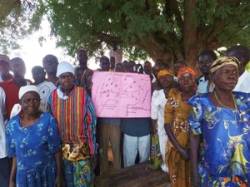I jumped at the opportunity to review “Transforming Cash Transfers: Beneficiary and community perspectives on the Senior Citizen Grant in Uganda”, a new briefing by the Overseas Development Institute (ODI). After only about a year of delivering payments,
there appear to be signs that the programme is having important transformative
impacts on the lives of recipients.
The Senior Citizens Grant in a nut shell
 Uganda’s new social pension, the Senior Citizens Grant (SCG), is creating waves in social protection debate in East Africa and beyond. It is universal, transferring US$8.40 a month to everyone aged 65 and over in programme locations. For the conflict affected region of Karamoja, the age of eligibility is reduced to 60 years. Recipients receive the payment securely through an electronic payment via mobile phone. This e-credit is then converted into cash at a local mobile phone vendor using a unique pin code and identity card. The programme is implemented through the Ugandan Government with significant support from donors (DFID, IrishAID and UNICEF) and includes embedded grievance procedures as an important component of service delivery.
Uganda’s new social pension, the Senior Citizens Grant (SCG), is creating waves in social protection debate in East Africa and beyond. It is universal, transferring US$8.40 a month to everyone aged 65 and over in programme locations. For the conflict affected region of Karamoja, the age of eligibility is reduced to 60 years. Recipients receive the payment securely through an electronic payment via mobile phone. This e-credit is then converted into cash at a local mobile phone vendor using a unique pin code and identity card. The programme is implemented through the Ugandan Government with significant support from donors (DFID, IrishAID and UNICEF) and includes embedded grievance procedures as an important component of service delivery.
Transformative findings
The findings themselves strike familiar notes given previous research on the impacts of social protection on the wellbeing of recipients and their families. Of course, we’d expect to see several immediate impacts, such as improved capacities to meet basic consumption needs (food, health, clothing and so on), that relate logically to increased incomes. But I was really interested to see if, and how, the programme is impacting on behaviours amongst recipients and their families and neighbours.
Even more compelling are the findings related to livelihoods, social capital, self-esteem and the re-instatement of dignity. These are the transformative outcomes that, whilst not an immediate priority for a programme aimed at poverty reduction, have longstanding potential to break cycles of poverty. Such impacts are things for society to mobilise around and to build social contracts on in terms of ensuring a transition from Aid to Government fulfilled entitlements to social protection.
“What surprised me are the old people who had been abandoned by neighbours and their relatives and clan members. These people started coming back to reinvigorate their relationships with the elderly. The grandchildren come around because they know the grandmother is cooking something and grandfathers carry some pancakes to their grandchildren“
(Group interview with the SAGE team, Nebbi district, Transforming Cash Transfers, p. 62)
Similarly compelling are the observations described in another recent policy briefing on the SCG published by Pathways Perspectives. Distinctively titled – Grandmas, Pensions and Clitorises – the brief makes the connection between addressing income poverty amongst older women and tackling livelihood motivations behind Female Genital Mutilation (FGM) practices.
“Everyone knew that the practice needed to beabandoned but, with the grandmothers still supporting it and with no other means of family support, the practice continued in secret. Now my mother uses the pension to support the household and is doing well in small businesses such as grinding and selling maize flour.”
(Pathways Perspectives #7, p. 1)
Both publications contribute to broadening the interest in cash transfers, moving away from a focus on social protection as a mechanism for results-based Aid focused on poverty reduction to one that acknowledges its transformative potential. These outcomes demonstrate the more profound role of unviersal social pensions in development, beyond welfare, but in terms of transformative social protection.
Read More
The ODI study is part of a broader collection of studies under a multi country project investigating beneficiaries and community perspectives in Kenya, Mozambique, Yemen and the occupied Palestinian Territories. Not only does the evidence provide a welcome contribution to thinking around cash transfers, but the ODI team should be congratulated on a compelling website and Facebook page with links to videos and photos from the research project.
The Pathways Perspectives briefing is part of a series of social policy focused papers which aim to stimulate debate by providing people with an opportunity to comment on key issues in international development.
Join the conversation on Twitter
What impact is #Uganda‘s #SocialPension having?Our new blog explores the Senior Citizens Grant’s transformative impacts:bit.ly/Y4hNRT
— Pension Watch (@PensionWatch) February 11, 2013
